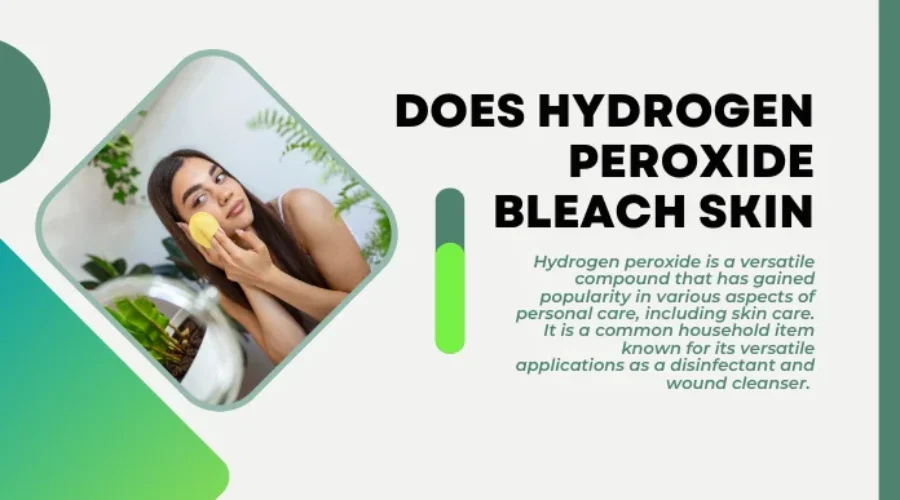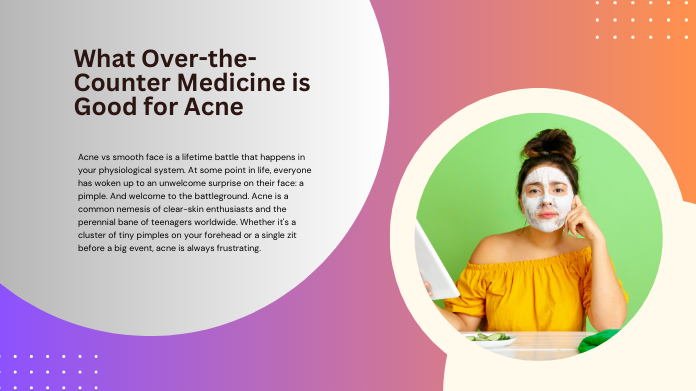Does Hydrogen Peroxide Bleach Skin
Hydrogen peroxide is a versatile compound that has gained popularity in various aspects of personal care, including skin care. It is a common household item known for its versatile applications as a disinfectant and wound cleanser. However, its potential to lighten the skin has sparked interest among individuals seeking remedies for acne, hyperpigmentation, and other skin issues.
However, the crucial question remains: Does hydrogen peroxide truly have the capacity to bleach the skin? In this article, we will explore the properties of hydrogen peroxide and its role in skincare products. We will delve into the topic of whether hydrogen peroxide can bleach the skin. Additionally, we will discuss natural alternatives to skin bleaching.
What is Hydrogen Peroxide?
Hydrogen peroxide is a chemical compound comprising two hydrogen atoms and two oxygen atoms (H2O2). It is a pale blue liquid with a bitter taste and a distinctive odor. This versatile substance has a wide range of uses, including as a disinfectant, antiseptic, and bleaching agent.
In its pure form, hydrogen peroxide is highly reactive due to its extra oxygen atom. When exposed to light or heat, it readily breaks down into water (H2O) and oxygen (O2). This decomposition reaction offers hydrogen peroxide sterilizing capabilities, killing bacteria, viruses, fungi, and other microbes.
Apart from its antimicrobial properties, hydrogen peroxide’s ability to release oxygen also makes it useful in wound healing. By providing extra oxygen to the injured area, it aids in disinfection while promoting tissue repair. This feature has led to its inclusion in many first-aid kits and medical settings.
Why Hydrogen Peroxide is a Must-have Ingredient for Skin Care Products
Hydrogen peroxide, with its unique properties, has carved a niche for itself in the world of skincare. Its versatility and efficacy make it a must-have ingredient in various skin care products. Let’s explore some compelling reasons why hydrogen peroxide holds such significance in the realm of skin care:
1. Antibacterial and Antiseptic Properties: Hydrogen peroxide exhibits potent antibacterial and antiseptic properties, effectively combating harmful bacteria that can lead to acne or skin infections. By eliminating these microorganisms, hydrogen peroxide helps keep the skin clean and promotes a healthy complexion.

2. Cleansing Action: As an oxygenating agent, hydrogen peroxide actively removes impurities from the skin’s surface. It breaks down dirt, excess oil, and dead skin cells, unclogging pores and preventing acne breakouts. This cleansing action enhances the overall clarity and brightness of the skin.
3. Skin Lightening Abilities: Hydrogen peroxide’s oxidizing nature can assist in lightening uneven pigmentation or dark spots on the skin caused by factors like sun damage or melasma. It breaks down melanin pigments responsible for hyperpigmentation, revealing a more even-toned complexion.
4. Wound Healing Support: Hydrogen peroxide’s ability to release oxygen molecules aids wound healing by providing oxygen to damaged tissues. It disinfects wounds while promoting tissue repair and regeneration, making it an essential ingredient for first-aid kits and post-treatment care.
5. Oxidative Stress Protection: Despite being an oxidizing agent, hydrogen peroxide is also an antioxidant when used appropriately in skincare formulations. Low concentrations of hydrogen peroxide can help neutralize harmful free radicals on the skin due to its antioxidative properties.
6. Versatility in Formulations: Hydrogen peroxide is highly versatile and compatible with various skincare formulations. It can be incorporated into cleansers, toners, masks, and serums, delivering its benefits in multiple ways. This flexibility allows it to cater to different skin types and concerns.
7. Cost-Effective Option: Compared to some specialized skincare ingredients, hydrogen peroxide offers a cost-effective solution for treating various skin issues. Its accessibility and affordability make it an attractive choice for both manufacturers and consumers of skin care products.
Science Behind Skin Color and Bleaching
Skin color is one of the most prominent visible characteristics that distinguish humans. Human skin, hair, and eye color are determined by a pigment called melanin.
The amount and distribution of melanin determine an individual’s skin color. It is produced by cells known as melanocytes, primarily located in the epidermis – the outermost layer of our skin. These cells release melanin into nearby skin cells called keratinocytes. Several factors, including genetics, hormones, and exposure to sunlight, influence melanin in the skin.
Melanin comes in two primary forms. Eumelanin is responsible for brown to black pigmentation, and pheomelanin contributes to red and yellow hues. The varying ratio of these two types determines whether someone has fair skin or a darker complexion.
When it comes to bleaching the skin, hydrogen peroxide is often considered due to its potent properties. Hydrogen peroxide works as an oxidizing agent when applied to the skin. It generates oxygen radicals that break down melanin pigments through oxidation reactions. During this process, hydrogen peroxide donates oxygen atoms to specific chemical structures within melanin molecules, leading to their degradation. As a result, the concentration of melanin decreases in the affected areas of the skin, causing lightening effects.
Additionally, hydrogen peroxide can inhibit melanogenesis. Through this process, melanocytes produce and distribute melanin throughout the skin. This inhibition occurs by blocking key enzymes involved in melanin production, mainly tyrosinase. By disrupting this enzymatic activity, hydrogen peroxide limits the new melanin synthesis.
Furthermore, hydrogen peroxide affects cellular signaling pathways that regulate gene expression related to pigmentation. Modulating these pathways can influence cellular behaviors and processes associated with pigment production.
It is also worth noting that the effects of bleaching are not permanent. As new skin cells replace older ones, melanin production resumes, gradually restoring the original skin color. To maintain a lightened skin tone, ongoing use of hydrogen peroxide or other bleaching agents would be required. However, high concentrations or prolonged contact with hydrogen peroxide may cause skin irritation, dryness, or damage to the skin’s natural barrier function. Therefore, it is essential to follow the recommended guidelines and use products containing hydrogen peroxide carefully.
Natural Alternatives of Skin Bleaching
Many individuals seek safer and more sustainable methods to address skin concerns without resorting to harsh chemical bleaching agents. If you’re looking for a more natural approach to achieve brighter and more even-toned skin, here are some compelling alternatives to consider.
1. Lemon Juice: Rich in citric acid, lemon juice is a natural bleaching agent. Its acidic properties help exfoliate the outer layer of the skin and lighten pigmentation over time. Gently apply fresh lemon juice on the affected areas, leave it for 10-15 minutes, then rinse thoroughly.
2. Turmeric: Widely used in traditional medicine and skincare routines, turmeric contains an active compound called curcumin with antioxidant and anti-inflammatory properties. It has been found to inhibit excessive melanin production, reducing hyperpigmentation naturally. Mix turmeric powder with lukewarm water or honey and apply it as a face mask for 15-20 minutes before rinsing.
3. Aloe Vera: Known for its soothing properties, aloe vera also has mild depigmenting effects on the skin. The plant contains aloesin, which inhibits tyrosinase activity – an enzyme involved in melanin synthesis. Apply pure aloe vera gel directly to the affected areas twice daily for optimal results.
4. Papaya: Enzymes like papain in papaya exfoliate dead skin cells and promote brightening skin over time. Mash green papaya into a pulp and apply it as a mask on cleansed skin for 15-20 minutes before rinsing off.
5. Licorice Root Extract: With its proven ability to reduce hyperpigmentation, licorice root extract is commonly used in natural skincare products targeting discoloration. It contains glabridin, which inhibits tyrosinase activity and reduces melanin production. Look for skincare products containing licorice root extract or apply diluted licorice tea directly onto the skin as a toner.
6. Yogurt: The lactic acid present in yogurt acts as a mild exfoliant and promotes skin cell turnover, revealing a brighter complexion. Apply plain yogurt to the face for 10-15 minutes before rinsing off gently.
Adverse Effects of Hydrogen Peroxide for Skin Bleaching
Hydrogen peroxide is a highly potent chemical compound. It may seem like a convenient and affordable solution to lighten skin, but it can severely harm the skin.
1. Skin Irritation: One of the most common adverse effects of hydrogen peroxide use on the skin is irritation. It can cause redness, itching, and a burning sensation. This is particularly true for individuals with sensitive or reactive skin types.
2. Dryness and Thinning of the Skin: Prolonged use of hydrogen peroxide can lead to excessive skin drying, resulting in flakiness and an overall dehydrated appearance. The bleaching action can also affect the natural oils the skin produces, leading to further dryness. In some cases, consistent use may even cause thinning of the epidermis over time.
3. Increased Sensitivity to Sun Exposure: Hydrogen peroxide breaks down melanin, which provides natural protection from harmful UV rays. As a result, using hydrogen peroxide on your skin increases its sensitivity to sunlight. This heightened vulnerability can lead to sunburns and potential long-term damage from UV radiation.
4. Uneven Skin Tone: Hydrogen peroxide can produce hypopigmentation or hyperpigmentation when applied unevenly or at high concentrations. They can cause patchy lightening or darkening of the skin. These uneven results are not only aesthetically undesirable but can also be challenging to correct.
5. Allergic Reactions: Some individuals may develop allergic reactions when exposed to hydrogen peroxide due to its strong oxidizing properties. Symptoms may include hives, swelling, or even difficulty breathing in severe cases. It is vital to perform a patch test before using hydrogen peroxide on larger areas of the skin to identify any potential allergic reactions.
6. Disruption of Skin pH Balance: Maintaining a balanced pH level is crucial for healthy skin. However, the use of hydrogen peroxide can disrupt this delicate balance. This can lead to an alteration in the microbial flora, potentially causing issues such as acne flare-ups or other unwanted skin conditions.
Conclusion
Hydrogen peroxide is a versatile compound that exhibits antibacterial properties, exfoliation benefits, and potential skin lightening effects. When used responsibly and in controlled concentrations, it can be an effective addition to skincare regimens.
However, it can have adverse effects on the skin. While some individuals may use hydrogen peroxide as a method to lighten their skin, it is essential to exercise caution and understand the potential risks involved. Therefore, consult a dermatologist before incorporating hydrogen peroxide or any other substances into your routine.



